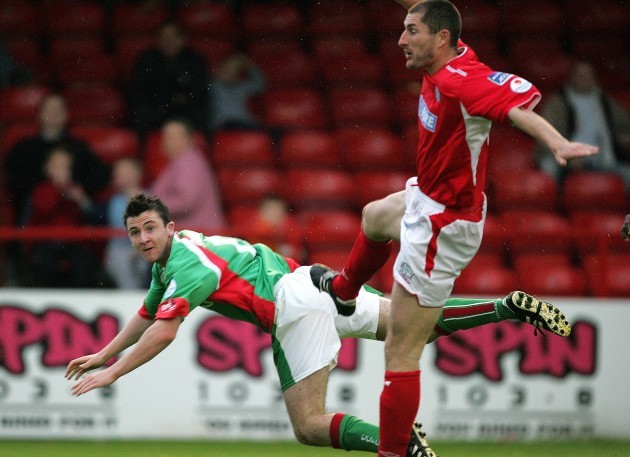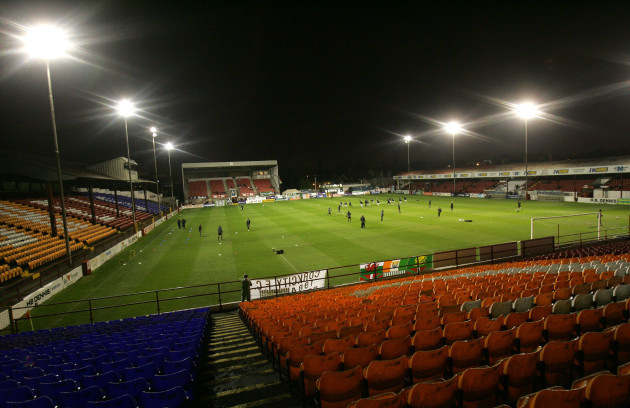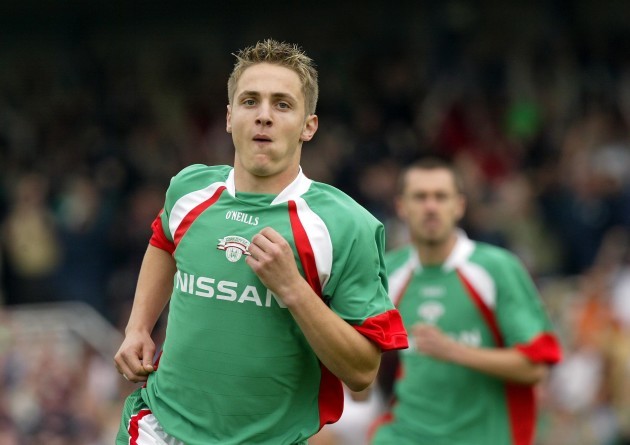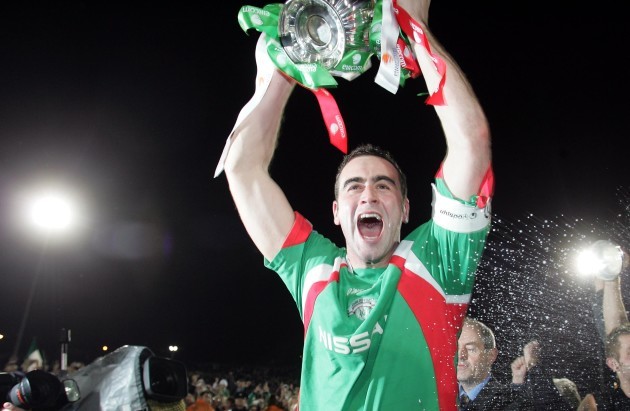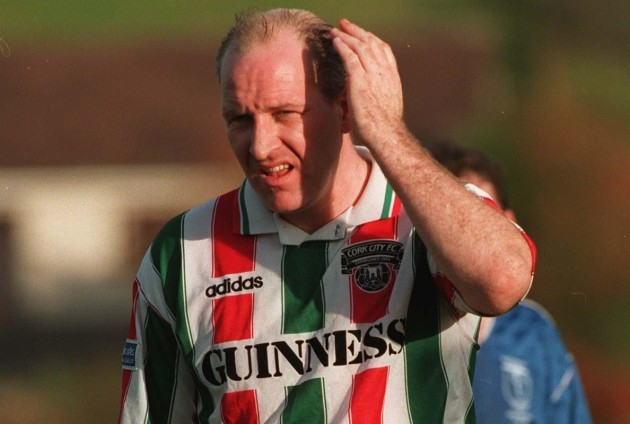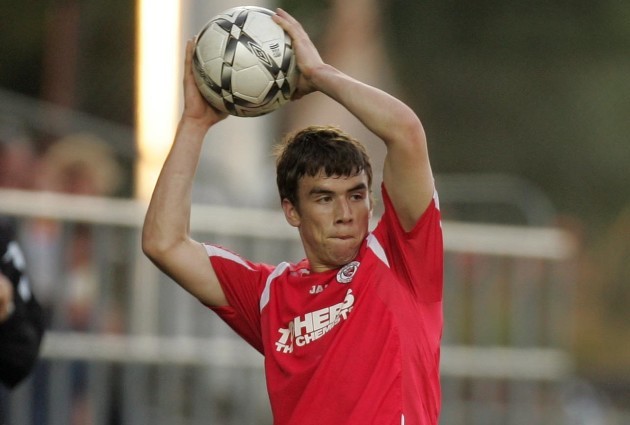AFTER I WAS shown the red card by a girlfriend in 2005, a friend of mine suggested the perfect tonic.
On a Monday afternoon in May, I pointed my Peugeot 206 in the direction of Dublin and we made it to Tolka Park in time to see Cork City get the better of Shelbourne, the defending Premier Division champions.
As we headed back down south afterwards, discussing how the 2-0 win had given Damien Richardson’s side a three-point lead at the top of the table, I knew I was about to rekindle my relationship with Cork City, an ex-partner I should never have abandoned.
Cork City Football Club and I were born in the same year, but we were six-years-old when our paths crossed for the first time. Since then, the League of Ireland has been a constant in my life — with the exception of a two-to-three-year period prior to that night in Drumcondra.
During that time, the opposite sex and the novelty of being able to walk into a pub without a fake ID combined to wrench my attention away from Turner’s Cross. I still showed my face every once in a while, but my interest in Cork City was generally satisfied by the occasional glance at internet forums or the back page of the Evening Echo.
The 2005 season was a convenient time for me to get back on track. Seven days after my Tolka Park therapy, Kevin Doyle scored both goals in a 2-0 home win against Finn Harps. He was wearing a Reading shirt when he next set foot on a pitch, but the likes of John O’Flynn, Neale Fenn, George O’Callaghan, Roy O’Donovan and Liam Kearney ensured that City weren’t hampered by the departure of Doyle and up-and-coming striker Shane Long.
As well as reaching the FAI Cup final and progressing through a couple of rounds in the UEFA Cup, the team spent most of that season at the summit of the Premier Division. Their lead over Derry City had been cut to a point by 11 November when I embarked on another journey to Shelbourne’s patch on the penultimate weekend of the campaign.
On this occasion, the Peugeot never made it to Dublin. Just after passing through Abbeyleix, it was one of several vehicles involved in an accident in which a 17-year-old boy lost his life.
City were held to a scoreless draw that night. Coupled with Derry’s 2-0 win over St Patrick’s Athletic the next day, it meant that the Candystripes had the upper hand when they came to Cork the following Friday for a cup final-style climax to the season.
Cork was buzzing in the build-up to the game, but I was oblivious. I struggled to see the significance of football in the wake of such a tragedy. For most of the week I was adamant that I’d give it a skip. In the end I went because I needed something to take my mind off it.
Thanks to John O’Flynn’s head and Liam Kearney’s left foot, Cork City were crowned Premier Division champions for the first time in 12 years. Given the events of the previous week, my celebrations were muted. I can appreciate the occasion more with hindsight.
Although my own car hadn’t caused the accident, the death of the young man played on my mind for quite a while. Ultimately I wanted to know more about him and came across an article in a local newspaper which described him as an important member of his local GAA club. It struck me how references to sport feature regularly in such eulogies.
When a death occurs, it’s often said that it puts things like sport in perspective. It took me a long time after November 2005 to scratch beneath the surface of that logic. Nothing can ever match the value of a life, of course, but — for those with any interest or involvement in it — sport is a large part of what makes life so valuable in the first place.
Even though I was raised in a house where the Liam MacCarthy Cup was the holy grail, nothing has done a better job of teaching me the value of sport than the League of Ireland.
Cork had just been crowned All-Ireland hurling champions when I was first taken to Turner’s Cross, but nearly a decade passed before they won it again. In some of the years that followed, the hurlers played only one game of significance all season. But the League of Ireland was always there, week after week after week.
I’ve written previously about how it was my dad who introduced me to the League of Ireland. Nowadays he’s a friend as much as he is a father, the kind of father I strive to be myself, but in my formative years we didn’t always see eye to eye — mainly due to my own juvenile hang-ups.
Sport was our common ground, however, and those trips to Turner’s Cross were more important for our relationship than I realised at the time.
I’d have to jog down Evergreen Road just to keep up with him and my older brother as we made our way to the Cross. When we got there, a minute seldom passed without me firing a question his way.
- “Can we get a programme?”
- “Who’s better: Pat Morley or John Caulfield?”
- “Do you think AC Milan might buy Dave Barry?”
- “Why is everyone telling the Dubs to f**k themselves?”
My dad and I watched plenty of football on television too. Like a lot of Irish kids, I called myself a Manchester United fan for a while. Previous spells as a supporter of Liverpool, Aston Villa, Tottenham Hotspur, Everton and Oxford United — don’t ask! –just didn’t work out for me.
As father and son, football was the subject over which we first bonded. When I reflect on those years, good memories from Turner’s Cross are abundant. As for the times we watched football from the couch, nothing springs to mind.
As John O’Sullivan, our League of Ireland columnist, pointed out in a piece last June, it’s important that Irish children don’t grow up believing that football is a TV show.
Although it’s a relatively rare occurrence, there are times when League of Ireland fans are the envy of the Irish football community. Last summer was a case in point. After Ireland reached the knockout stages at Euro 2016 with eight League of Ireland graduates in Martin O’Neill’s squad, Dundalk and Cork City also both exceeded expectations in Europe.
During these occasional periods of prosperity, declarations such as “I’m going to start coming out here for every game”, or “I should have been coming here before now”, are often overheard. That was certainly the case in Cork, as I’m sure it was too in Oriel Park, as well as in Sligo in 2012 and in Inchicore a year later.
Whether you’re rekindling a relationship or starting afresh, the 2017 season — which begins on Friday night when Cork City and Dundalk contest the President’s Cup — offers an opportunity to leave such regrets in the past.
It’s an opportunity for parents to turn off the PlayStation and Sky Sports for a few hours to show their children that sport exists in front of their eyes and not just through a TV screen. It’s an opportunity to allow them to be the kid in school who saw the next Seamus Coleman in action long before he captained his country. And it’s an opportunity to create more memories that will shape your life. Loved ones excepted, I know that the greatest days of my life can mostly be linked to sport.
The League of Ireland is far from perfect, but stick with it and — if you’re truly passionate about the game — you won’t regret it. Don’t yield at the first hurdle because a match ended goalless and it rained.
Take the time to identify with the players, form an attachment to your club and nothing will ultimately compare with the feeling that accompanies its successes. Not every season will be a 2005, but the longer that takes, the more satisfying the rewards are when they finally arrive.
Ireland’s 2-1 loss to France at last summer’s European Championships attracted more Irish TV viewers than any other sporting event in 2016. Six of the Irish players who took part in the game came through the League of Ireland, yet that level of interest doesn’t manifest itself in attendance figures for our domestic fixtures.
The League of Ireland has given more to Irish sport than it has received in return. If you’ve been threatening to make it a regular feature on your sporting calendar, there’s never been a better time to do so.
Last year brought plenty of reasons for optimism for the future, so perhaps 2017 can be the turning point. That’s now in the hands of those who share in the belief that sport forms such a substantial part of what makes life worth living.
It’s time for football to put the League of Ireland in perspective. It isn’t a matter of life and death, but Irish sport would certainly be a lesser place without it.
Maybe it’s wishful thinking to expect anything to change significantly for the League of Ireland this year. Having said that, if a broken heart can mend on a miserable Monday night at Tolka Park, nothing is impossible.
